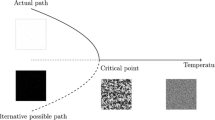Abstract
The viability of a living system is a non-trivial concept, yet it is often highly simplified in models of adaptive behavior. What is lost in this abstraction? How do viability conditions appear in the first place? In order to address these questions we present a new model of an autopoietic or protocellular system simulated at the molecular level. We propose a measurement for the viability of the system and analyze the ‘viability condition’ that becomes evident when using this measurement. We observe how the system behaves in relation to this condition, generating instances of chemotaxis, behavioural preferences and simple (yet not trivial) examples of action selection. The model permits the formulation of a number of conclusions regarding the nature of viability conditions and adaptive behaviour modulated by metabolic processes.
Access this chapter
Tax calculation will be finalised at checkout
Purchases are for personal use only
Preview
Unable to display preview. Download preview PDF.
Similar content being viewed by others
References
Ashby, W.R.: Design for a brain. J. Wiley, Chichester (1952)
Nolfi, S., Floreano, D.: Evolutionary Robotics. MIT Press, Cambridge (2000)
McFarland, D., Houston, A.: Quantitative Ethology. Pitman (1981)
Meyer, J., Guillot, A.: Simulation of adaptive behavior in animats: review and prospect. In: Proc. of SAB 1990, pp. 2–14. MIT Press, Cambridge (1990)
Beer, R.D.: The dynamics of adaptive behavior: A research program. Robotics and Autonomous Systems 20, 257–289 (1997)
Alexandre, G., Zhulin, I.B.: More than one way to sense chemicals. Am. Soc. Microbiol. 183 (2001)
Rasmussen, S., Bedau, M.A., Chen, L., Deamer, D., Krakauer, D.C., Packard, N.H., Stadler, P.F.: Protocells. MIT Press, Cambridge (2008)
Varela, F.J., Maturana, H.R., Uribe, R.: Autopoiesis: The organization of living systems, its characterization and a model. BioSystems 5, 187–196 (1974)
McMullin, B.: Thirty years of computational autopoiesis: A review. Artificial Life 10, 277–295 (2004)
Suzuki, K., Ikegami, T.: Emergence of protocell systems: Shapes and movements. In: Proc. of Artificial Life X Workshop (2006)
Egbert, M.D., Di Paolo, E.A.: Adding behavior to autopoiesis: An exploration in computational chemo-ethology. Adaptive Behavior (2009) (forthcoming)
Author information
Authors and Affiliations
Editor information
Editors and Affiliations
Rights and permissions
Copyright information
© 2011 Springer-Verlag Berlin Heidelberg
About this paper
Cite this paper
Egbert, M.D., Di Paolo, E.A., Barandiaran, X.E. (2011). Chemo-ethology of an Adaptive Protocell. In: Kampis, G., Karsai, I., Szathmáry, E. (eds) Advances in Artificial Life. Darwin Meets von Neumann. ECAL 2009. Lecture Notes in Computer Science(), vol 5777. Springer, Berlin, Heidelberg. https://doi.org/10.1007/978-3-642-21283-3_31
Download citation
DOI: https://doi.org/10.1007/978-3-642-21283-3_31
Publisher Name: Springer, Berlin, Heidelberg
Print ISBN: 978-3-642-21282-6
Online ISBN: 978-3-642-21283-3
eBook Packages: Computer ScienceComputer Science (R0)




